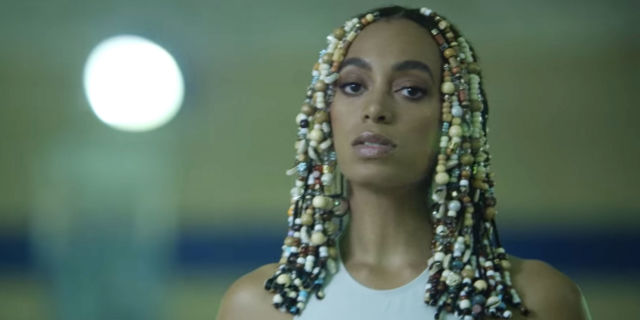How often have you said that in your lifetime? Or at least wish you had after having your hair pried through and pulled on by curious peers, our hair is more than an attention grabber it is an extension of ourselves as it operates as a form of cultural expression. I get excited when I see African-American celebrities using their platforms to make a positive impact on the black community. In this song Solange pairs her beautiful voice with an all black cast to illustrate black beauty in the video to her song Don’t Touch My Hair. The music video is directed by Knowles’ husband Alan Ferguson.
The beginning of the video opens with Solange wearing braids decorated with wooden beads, as she swings her head from side to side she sings, “Don’t touch my hair”. The smooth melody of the song almost make the lyrics sound like a soft cry as she sings, “It’s the feelings I wear”. Hair is a powerful trait in the black community, our ability to shape and mold our hair into styles is a gift that we are able to use as a form of expression. For example, over my lifetime I’ve had hundreds of styles, like many black men and women, from cornrows, to individuals, to twists our hairstyles are more than ‘trends’ they are a practice of cultural significance and a significant form of self-expression.
The images in the video are filled with smooth movements and melodic dancing in simple settings, indoor and outdoor. Every person in the video is of African decent, a rare occurrence to see in American media, while all white casts are the norm with the occasional person of color. The all black cast is refreshing for me, especially as a black person who rarely has the opportunity to see examples of black beauty in American media.
Throughout the song Solange relates her hair to her soul, her pride, her crown, her vision all of which show the significance of afro textured hair on black bodies, the one thing we’ve always been able to own and control, that cannot be taken away. Until recently, District 11’s Court of Appeals ruled that employees do not have the right to wear dead locs. So Marc Jacobs’ all white runway cast can wear locs but we can’t? Locs are a style traditionally worn on afro textured hair. The Appeal’s court decision is a direct attack on the black population. After hearing this ruling I styled my hair into locs as a form of protest in support for my brothers and sisters who wear locs in the workplace. An Instagram hashtag, #professionallocs, developed with pictures of black professionals from surgeons and producers to teachers and lawyers. African-Americans with locs across the country flooded social media supporting and encouraging each other. We can no longer allow ourselves to be whitewashed in the name of ‘professionalism’.
In addition to this, our hair is being censored in not only the workplace but also in primary education, young girls worldwide are being forced to comply to whitewashed dress codes. Schools in Kentucky, Ohio and even Africa have attempted to ban hairstyles like afro puffs, braids, cornrows and other traditionally black hairstyles. Why is our blackness being banned?
The video ends with a powerful image; a large group black men and women dressed in all white while dancing on white house steps as the lyrics repeat, “What you say to me?”.
This is our response to all of the ignorant questions and comments we hear each day “Can I touch your hair?”, “Is that your real hair?” “You’re not allowed to wear your hair that way.”
We must remind ourselves what Solange sings, “But this hair is mine”. Our bodies are our own and we must use our gifts to empower each other.
Black beauty is ALWAYS beautiful on Black bodies. Watch the official music video below.

